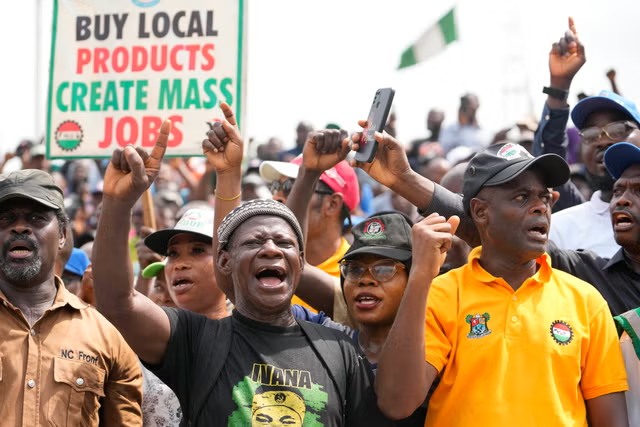Nigeria Faces Massive Power Outage
Nigerian currently national power outage due to a national grid shutdown caused by a nationwide strike protesting the rising cost of living. The blackout occurred around 02:00 local time when union members blocked operators at power control rooms from working and shut down electricity substations. As a result, workers cancelled many flights at the busiest airports in Lagos and Abuja, stranding passengers.
Demand for Higher Minimum Wage
Unions are demanding a significant increase in the minimum wage, arguing that workers cannot survive on the current rate of 30,000 naira (£18; $22) per month. Although the government has proposed doubling this amount, it remains insufficient to cover basic necessities. Security guard Mallam Magaji Garba noted that the proposed increase still wouldn’t cover the cost of a 50kg bag of rice, which is essential for feeding his family.
Economic Challenges
Garba highlighted the disparity between top government officials’ earnings and those of the lowest-paid workers. He often walks to work as he cannot afford transport. This strike, the fourth since President Bola Tinubu took office last year, underscores the severe economic challenges facing Nigerians, exacerbated by the removal of a fuel subsidy and a significant depreciation of the naira.
Union Demands and Government Response
The Nigeria Labour Congress and the Trade Union Congress demand the government raise the minimum wage to 494,000 naira (£290; $369) to match the current economic realities.However, the government warns that meeting these demands would cripple the economy and lead to job losses, as many businesses would be unable to afford higher wages.
Impact of the Strike
The strike has led to the closure of schools, offices, and hospitals across the country. Nigerians are grappling with inflation nearing 34% and a weakened naira. The government’s decision to end the policy of pegging the naira to the US dollar has caused the currency’s value to plummet.
Future Economic Reforms
President Tinubu argues that the removal of the fuel subsidy and the devaluation of the naira are necessary steps to reform the economy. These measures aim to create long-term benefits but immediately increase financial strain for many Nigerians. The government’s ability to navigate these economic reforms while addressing the concerns of workers will be crucial in the coming months.
Follow us on Socials:

